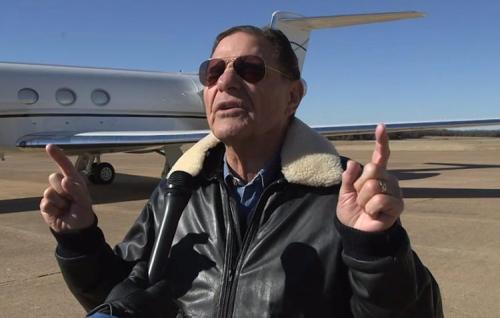
Kenneth Copeland in front of His Private Jet which he Flies Because “Demons fly Commercial”
Friends of Padre Steve’s World,
I have been mulling over writing about this since I first learned that the heretical Prosperity Gospel preacher Kenneth Copeland had been invited to speak at the National Prayer Breakfast at Fort Jackson South Carolina. In 2013 Copeland along with the faux Christian “historian” David Barton claimed on Copeland’s television show that PTSD is not real because PTSD is not Biblical
Copeland, who is a member of President Trump’s Evangelical Advisory Council has had his ministry issue a clarification of his remarks, but that being said the “clarification” smacked of more of a defense of his theology than a compassionate attempt to understand the ravages of PTSD.
I wish I was kidding, but neither Copeland or Barton have ever served in the military or been in combat and now Copeland is speaking this morning at the Fort Jackson NCO Club. Copeland is a self-described Christian Extremist claimed on his show with Barton nodding in agreement that PTSD doesn’t effect true believers.
The Garrison Chaplain’s Office was a key part of that decision. I know a number of Chaplains stationed at the Post who protested in vain about the decision to invite Copeland. The breakfast is voluntary, but I can testify from years of military service in both the Army and the Navy that attendance is highly encouraged and chaplains are routinely pressured by senior conservative Evangelical Christian chaplains and commanding officers regardless of their own beliefs. The pressure is most effective on younger junior chaplains or other junior officers, typically company commanders or battalion or brigade staff officers.
Really, I first experienced this when I was a company commander in Wiesbaden Germany in 1986, as a brigade staff officer at Fort Sam Houston Texas in 1987, a mobilized Army Reserve Chaplain in Germany in 1996, and a number of other times. The last one of these was when I was at Camp Lejeune North Carolina in 2000. I guess that I was lucky that deployments and operational commitments kept me from attending such events until I came back from Iraq in February of 2008. After that deployment suffering from severe PTSD and a crisis in faith I only attended one more at Naval Medical Center Portsmouth in 2009, and once I became a senior and supervisory Chaplain I refused to serve as the host to such events because they are all too often platforms for politicians to ingratiate themselves with the military and as photo ops for high flying preachers who then use the video or pictures to show to their followers how they support the military and in the process use those for fundraising purposes. If chaplains want to bow the knee to that kind of idolatry and to use that rather old-fashioned and judgmental word “sin” than they can, but I won’t.
But Copeland has no shame. His comments about PTSD and the trauma experienced in combat are not limited to his 2013 show but are found throughout his remarks which are reckless and full of incredibly poor biblical exegesis and hackneyed heretical theology. My God, I’m actually sounding like I am orthodox in my Christian beliefs despite being liberal, but that’s because I am.
But I do struggle with faith every day. From 2008 to just before Christmas of 2009 I was struggling so badly that I was for all purposes an agnostic praying that God still existed even as I dealt with people in life and death situations on a daily basis as a critical care ICU chaplain at the Naval Medical Center. I figure that I believe now about 60% of the time, and when I do I really believe, when I don’t it is to be gently described as difficult.
I have lived with PTSD for a decade. I know what it is to be clinically depressed, suicidal, and to be labeled and ostracized by Christians, other clergy, chaplains, and long time friends all because what I was going through did not match their theology. I have been honest in documenting my struggle with PTSD and moral injury on this blog which I began in February 2009 in past as a way to process what was happening to me, as well as my struggle with faith and belief. Because of that was contacted by reporters and with the help of caring Pubic Affairs Officers and commanders I was able to share my story in the Jacksonville NC Daily News, the Washington Times, Huffington Post the Department of DOD Real Warriors Campaign project. All were terrifying experiences because even though I wrote about my story here, the fact that they went out in local, national, and DOD sites exposed me to more publicity than I could sometimes deal with but I did them to encourage other veterans, especially those in helping and caring professions,; physicians, nurses, chaplains, corpsmen, and medics to see help and not suffer alone and in silence.
I am sure that has affected my career and I while some people were quite compassionate a lot, especially Christians were not. As far as my career went I was effectively sidelined after Iraq and placed in billets that very few were ever promoted out of, and ultimately that is okay because it made me realize what is really important in caring for and leading men and women in the military. I probably will retire as a Navy Commander in two years, maybe three, and move on with life after what will then be 39 to 40 years of military service. Since I spent 17 1/2 years in the Army and resigned my commission as a Major in the Army Reserve to go on active duty as a Navy Lieutenant in 1999 I have nothing to be ashamed of; I don’t know too many people who have risen to be a Field Grade Officer in the Army and a Senior Officer in the Navy. I am profoundly grateful that I still am able to serve and to care for young sailors, marines, soldiers, and chaplains.
In the mean time I still suffer the effects. I am doing a lot better now in large part because of my wife Judy and my three Papillon dogs, Minnie, Izzy, and Pierre. Izzy especially is very sensitive to my moods and we often describe her as “Nurse Izzy.” That being said in 2015 I crashed so badly that my colleagues at the Joint forces Staff College feared for me and ensured that I got help. I have suffered concussions, sprained my neck, bruised my jaw, and broken my nose during various combat related night terrors.
I have had friends, including chaplains, commanders, and others who I have served with lose their careers, families, and even take their lives while struggling with PTSD. Some were much better Christians than I could ever hope to be, and the presence of Kenneth Copeland speaking on one of the Army’s largest training bases where there are many young, vulnerable, and impressionable recruits who have never been to war, but who probably end up at war is offensive to me.
I am not against faith, spiritual fitness, or finding inspiration and help for life’s struggles in the Bible; but I am against charlatans of any kind that spout all kinds of base doctrines while profiting off of their victims, or should I say followers?
So anyway, to Mr. Copeland and those who invited him, have a nice breakfast. I hope that the bacon gives you indigestion and the undercooked scrambled eggs give you the shits.
I’ll get hate mail for this as there is nothing more unforgiving and vengeful than fundamentalists scorned.
Until tomorrow,
Peace
Padre Steve+

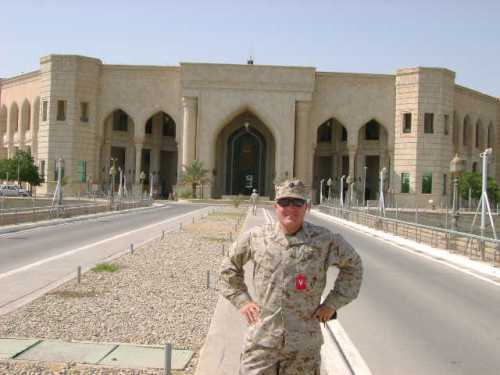 Outside the Al Faw Palace, Camp Victory the HQ of US Forces and Former Haunt of Saddam Hussein, the Palace was Named after the Victory of the Iraqis over the Iranians on the Al Faw Peninsula toward the end of the Iran-Iraq War. The Palace sits in the middle of a lake
Outside the Al Faw Palace, Camp Victory the HQ of US Forces and Former Haunt of Saddam Hussein, the Palace was Named after the Victory of the Iraqis over the Iranians on the Al Faw Peninsula toward the end of the Iran-Iraq War. The Palace sits in the middle of a lake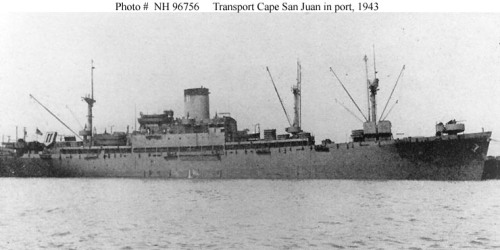 WWII Troopship USS Cape San Juan 1943
WWII Troopship USS Cape San Juan 1943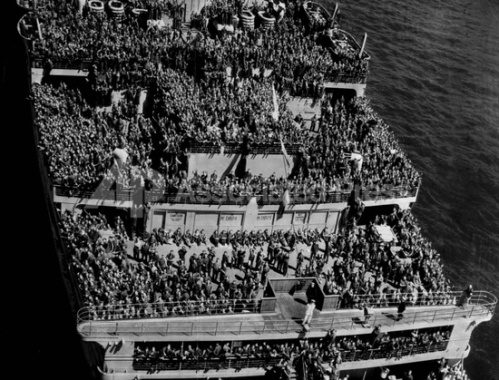 Troops on RMS Queen Mary
Troops on RMS Queen Mary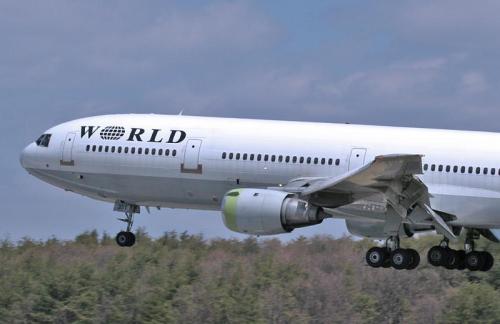 World Airways DC-10
World Airways DC-10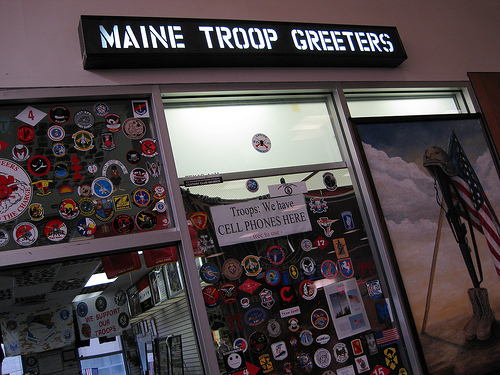
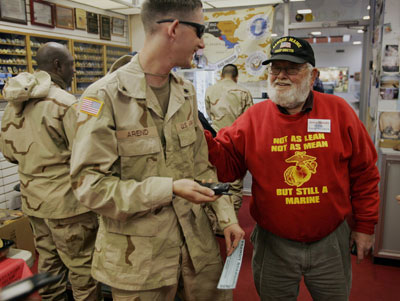 Maine Troop Greeters
Maine Troop Greeters 